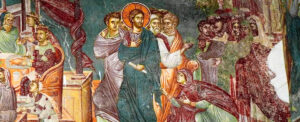by Elder Joseph of Vatopaidi (+2009)
“Pleasures” are those things which give pleasure (ηδονή) and sweeten our lives. They are dual, like our human nature. As we possess a body and a soul, and each one of us has his senses and his body, in the same way pleasures belong to both the physical and the mental nature. There are the physical pleasures, which are felt through the body; there are the mental pleasures, which belong to our rational and spiritual world.
The pleasures are mostly the result of our performance and they either console or disappoint us, in accordance with our correct or wrongful deed. If our plan and the goal of our motions is in “accordance to God” and His will, the emotions and the pleasures which result are pleasing and leave a sweet taste. If, however, our inclinations and deeds are irrational and full of passions, then we feel disgust and abhorrence.
The pleasures, however, which most enthrall and seduce us, are the ones which relate to our biological nature and are found in our bodily parts and senses. The senses of taste, touch and smell hold the first position. The taste of sweetness, when we come into contact with material things and motions is called pleasure.
Here one needs to possess the discernment of the “correct measure” to avoid abuse. Our biological essence forms the greatest part of our existence and is based on the senses. It is through these that satisfaction and pleasure occurs.
Once a person remembers his destination — and that he eats in order to live — then he can control the pleasures according to the law of “need” or of necessity. If, alas however, he lives to eat and spend — something which these days is the norm — then irrationality prevails, and I am embarrassed even to describe it.
There are also moral and sensual pleasures; mainly those which have to do with the generative instinct and the formation of relationships. Here we have a real labyrinth of perversion, whereby the abysmal Satan wins the most prizes.
The law and the motive to reproduce ourselves — a basic necessity in this exile— becomes the strongest attraction for the copulation of the two sexes. Then the most powerful pretext of illegal hedonism begins, which really crashes the inexperienced youth.
We have described briefly the reasons for the attainment of pleasure. It is now up to us to employ wisdom in denying them, to prevent ourselves from crying over the ruins because of their illegitimate admission and use. These principles refer to the sensual and secular pleasures.
However, there are also spiritual pleasures, which truly relax and encourage us. The spiritual pleasures are the energies and fruits of the divine Grace, which console and ease the efforts in the spiritual realm, enlighten the intellect, pacify the heart and comfort the senses and boost courage and hope at times of difficulty.
What else are joy, peace, patience, tolerance and all that is born out of love and sympathy if not spiritual pleasures? All the fruits and products of self-sacrifice, which love demands, are the sweetest spiritual pleasures which cause the greatest joy in our lives.
However, there are also the supernatural pleasures, which the divine Kindness awards to us in this life, even though they belong to the metaphysics of the future world, as a preamble to the bliss which awaits us. Such pleasures, as beyond nature, are neither controlled nor are they programmed by us in this world, but they are the trophies of the divine, consummate Love to encourage and comfort those who are fighting in the good struggle. Some of such pleasures are: the quietness of thoughts, liberation from the fight against passions, the total death in relation to secular things and motions, as well as the ascent of the divine Grace to those who have accomplished their purity of heart. These people are said to be “experiencing the divine” and are extricating themselves from the ways and experiences of this world. Such people are those for whom our Lord has given His testimony and has declared that He will reveal Himself to them and will “reside inside them” together with His Father. All those who wish to enjoy all these supernatural trophies and virtues, let them strive to adhere to the commandments. Our Lord “keeps His promises”.
Translated from the Greek: Γέροντος Ιωσήφ Βατοπαιδινού, Συζητήσεις στον Άθωνα, Ψυχοφελή Βατοπαιδινά 13, Ιερά Μεγίστη Μονή Βατοπαιδίου, Έκδοσις Α’, Άγιον Όρος 2003, by Olga Konari Kokkinou.






